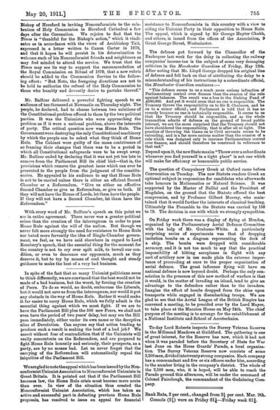The defence put forward by the Chancellor of the Exchequer
last week for the delay in collecting the railway companies' income-tax is the subject of some very damaging criticism in the Manchester Guardian of Friday, May 12th. After noting that Mr. Lloyd George dropped his original line of defence and fell back on that of attributing the delay to a misunderstanding of his instructions by a subordinate official, the Manchester Guardian continues :-
" This defence seems to us a much more serious infraction of Parliamentary control over finance than the evasion of the rule against balances. The result was a loss to the Sinking Fund of £680,000. And yet it would seem that no one is responsible. The Treasury throws the responsibility on to Sir II. Chalmers, and he on to a minor official; and Parliament is told that it has no remedy because no one is technically responsible. It seems to us that the Treasury should be responsible, and as the whole transaction admits of defence on the ground of broad public interest, we are the more surprised that the Treasury should not have shouldered the responsibility, that is after all so light. The practice of throwing the blame on to Civil servants seems to be extending, and is a far more serious matter than the evasion of a rule which was designed only to increase Parliamentary control over finance, and should therefore be construed in reference to that end."
Depend upon it, the new State maxim "Throw over a subordinate whenever you find yourself in a tight place" is not one which will make for efficiency or honourable public service.








































 Previous page
Previous page